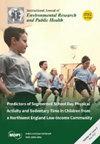感染艾滋病毒的女性对心脏健康和心血管风险的了解以及对干预措施的偏好
3区 综合性期刊
Q1 Medicine
International Journal of Environmental Research and Public Health
Pub Date : 2024-08-29
DOI:10.3390/ijerph21091149
引用次数: 0
摘要
心血管疾病(CVD)是受各种决定因素影响的重大健康问题。污名化和复原力已成为心血管疾病发展和管理的因素。感染艾滋病毒的妇女(WWH)的心血管疾病发病率高于未感染艾滋病毒的妇女。为了改善女性艾滋病感染者的心血管健康,需要全面了解这些因素是如何相互作用的,了解个人对降低风险干预措施的认识和意愿。研究方法作为一项针对年龄大于 35 岁的女性艾滋病患者心血管疾病风险研究的一部分,我们用英语开展了 90 分钟的焦点小组讨论(2022 年 5 月)。焦点小组旨在了解参与者的心血管疾病风险知识和潜在的预防策略。对文字记录进行了定性分析。结果:19 位世界卫生组织官员参加了三个焦点小组。参与者有以下经历:(a) 与艾滋病诊断相关的污名化(如家人、教会成员、医护人员);(b) 最近发生的事件(如自己/家人住院、家人死亡、胸痛)引发了促进心脏健康的生活方式改变和次优健康行为(如 COVID-19 流行病:不健康的零食)。参与者希望获得更多有关心血管疾病风险的知识("使命")。100%的参与者表示愿意服用药物或改变其他生活方式,以预防未来的心血管疾病事件。尽管参与者指出了预防心脏健康的行为(如食用健康食品;锻炼;限制压力、物质和吸烟),但也发现了一些误解(如 "染上 "心脏病)。结论医疗服务提供者和患者都需要了解与心脏健康有关的不同因素之间的相互作用,以便采取干预措施,降低美国南部地区感染艾滋病毒的少数种族/族裔妇女患心血管疾病的风险。本文章由计算机程序翻译,如有差异,请以英文原文为准。
What Women with HIV Know about Heart Health and Cardiovascular Risk and Intervention Preferences
Cardiovascular disease (CVD) is a significant health concern influenced by various determinants. Stigma and resilience have emerged as factors in CVD development and management. Women with HIV (WWH) have higher CVD rates than women without HIV. To improve cardiovascular health for WWH, a comprehensive understanding of how these factors interact, the understanding about individual awareness and willingness to engage in risk-reduction interventions are needed. Methods: As part of a study examining CVD risk among WWH aged >35 years old, 90-minute focus groups were conducted (May 2022) in the English language. Focus groups aimed to elicit participants’ CVD risk knowledge and potential prevention strategies. Transcripts underwent a qualitative analysis. Results: Nineteen WWH participated in three focus groups. Participants experienced the following: (a) enacted stigma related to their HIV diagnosis (e.g., family, church member, healthcare staff); (b) a recent event (e.g., hospitalization of self/family, death in family, chest pain) triggered both heart health-promoting lifestyle changes and suboptimal health behaviors (e.g., COVID-19 pandemic: unhealthy snacking). Participants wanted to obtain more knowledge (“on a mission”) about CVD risk. In total, 100% expressed willingness to take medication or embark on other lifestyle changes to prevent future CVD events. Although participants identified preventative heart health behaviors (e.g., eating healthy foods; exercising; limiting stress, substances, and smoking), misconceptions were also identified (e.g., “catching” heart disease). Conclusions: Understanding the interplay of the different factors related to heart health is needed both at the provider and the patient level to inform interventions that reduce CVD risk amongst racial/ethnic minoritized women with HIV, living in the Southern region of the US.
求助全文
通过发布文献求助,成功后即可免费获取论文全文。
去求助
来源期刊

International Journal of Environmental Research and Public Health
Medicine-Public Health, Environmental and Occupational Health
CiteScore
7.30
自引率
0.00%
发文量
14422
审稿时长
1 months
期刊介绍:
International Journal of Environmental Research and Public Health (IJERPH) (ISSN 1660-4601) is a peer-reviewed scientific journal that publishes original articles, critical reviews, research notes, and short communications in the interdisciplinary area of environmental health sciences and public health. It links several scientific disciplines including biology, biochemistry, biotechnology, cellular and molecular biology, chemistry, computer science, ecology, engineering, epidemiology, genetics, immunology, microbiology, oncology, pathology, pharmacology, and toxicology, in an integrated fashion, to address critical issues related to environmental quality and public health. Therefore, IJERPH focuses on the publication of scientific and technical information on the impacts of natural phenomena and anthropogenic factors on the quality of our environment, the interrelationships between environmental health and the quality of life, as well as the socio-cultural, political, economic, and legal considerations related to environmental stewardship and public health.
The 2018 IJERPH Outstanding Reviewer Award has been launched! This award acknowledge those who have generously dedicated their time to review manuscripts submitted to IJERPH. See full details at http://www.mdpi.com/journal/ijerph/awards.
 求助内容:
求助内容: 应助结果提醒方式:
应助结果提醒方式:


